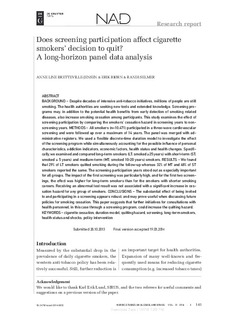Does screening participation affect cigarette smokers’ decision to quit? A long-horizon panel data analysis
Journal article
Permanent lenke
http://hdl.handle.net/11250/273810Utgivelsesdato
2014Metadata
Vis full innførselSamlinger
Sammendrag
INTRODUCTION: Despite decades of intensive anti-tobacco initiatives, millions of people are still smoking. The health authorities are seeking new tools and extended knowledge. Screening programs may, in addition to the potential health benefits from early detection of smoking related diseases, also increase smoking cessation among participants. This study examines the effect of screening participation by comparing the smokers’ cessation hazard in screening years to non-screening years.
METHODS: All smokers (n=10,471) participated in a three-wave cardiovascular screening and were followed up over a maximum of 14 years. The panel was merged with administrative registers. We used a flexible discrete-time duration model to investigate the effect of the screening program while simultaneously accounting for the possible influence of personal characteristics, addiction indicators, economic factors, health status and health changes. Specifically, we examined and compared long-term smokers (LT; smoked ≥25 years) with short-term (ST; smoked ≤ 5 years) and medium-term (MT; smoked 10-20 years) smokers.
RESULTS: We found that 29% of LT smokers quitted smoking during the follow-up whereas 32% of MT and 48% of ST smokers reported the same. The screening participation years stood out as especially important for all groups. The impact of the first screening was particularly high, and for the first two screenings, the effect was higher for long-term smokers than for the smokers with shorter smoking careers. Receiving an abnormal test result was not associated with a significant increase in cessation hazard for any group of smokers.
CONCLUSIONS: The substantial effect of being invited to and participating in a screening appears robust, and may prove useful when discussing future policies for smoking cessation. This paper suggests that further initiatives for consultations with health personnel, in this case through a screening program, could increase the quitting hazard.
Beskrivelse
-
